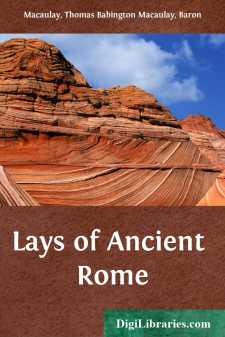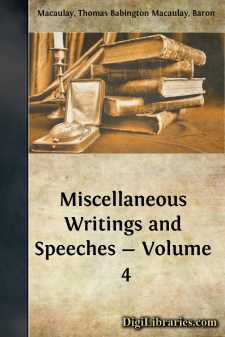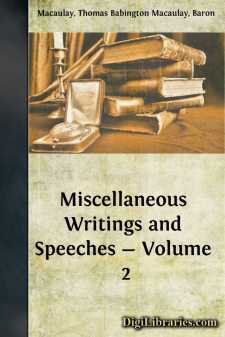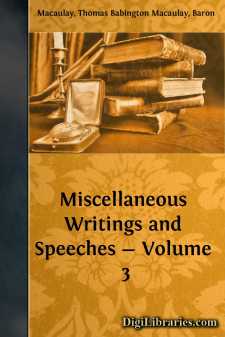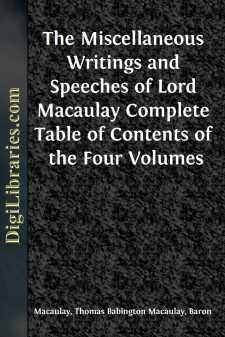Categories
- Antiques & Collectibles 13
- Architecture 36
- Art 48
- Bibles 22
- Biography & Autobiography 813
- Body, Mind & Spirit 142
- Business & Economics 28
- Children's Books 15
- Children's Fiction 12
- Computers 4
- Cooking 94
- Crafts & Hobbies 4
- Drama 346
- Education 46
- Family & Relationships 57
- Fiction 11828
- Games 19
- Gardening 17
- Health & Fitness 34
- History 1377
- House & Home 1
- Humor 147
- Juvenile Fiction 1873
- Juvenile Nonfiction 202
- Language Arts & Disciplines 88
- Law 16
- Literary Collections 686
- Literary Criticism 179
- Mathematics 13
- Medical 41
- Music 40
- Nature 179
- Non-Classifiable 1768
- Performing Arts 7
- Periodicals 1453
- Philosophy 64
- Photography 2
- Poetry 896
- Political Science 203
- Psychology 42
- Reference 154
- Religion 513
- Science 126
- Self-Help 84
- Social Science 81
- Sports & Recreation 34
- Study Aids 3
- Technology & Engineering 59
- Transportation 23
- Travel 463
- True Crime 29
Lays of Ancient Rome
Description:
Excerpt
That what is called the history of the Kings and early Consuls of Rome is to a great extent fabulous, few scholars have, since the time of Beaufort, ventured to deny. It is certain that, more than three hundred and sixty years after the date ordinarily assigned for the foundation of the city, the public records were, with scarcely an exception, destroyed by the Gauls. It is certain that the oldest annals of the commonwealth were compiled more than a century and a half after this destruction of the records. It is certain, therefore, that the great Latin writers of the Augustan age did not possess those materials, without which a trustworthy account of the infancy of the republic could not possibly be framed. Those writers own, indeed, that the chronicles to which they had access were filled with battles that were never fought, and Consuls that were never inaugurated; and we have abundant proof that, in these chronicles, events of the greatest importance, such as the issue of the war with Porsena and the issue of the war with Brennus, were grossly misrepresented. Under these circumstances a wise man will look with great suspicion on the legend which has come down to us. He will perhaps be inclined to regard the princes who are said to have founded the civil and religious institutions of Rome, the sons of Mars, and the husband of Egeria, as mere mythological personages, of the same class with Perseus and Ixion. As he draws nearer to the confines of authentic history, he will become less and less hard of belief. He will admit that the most important parts of the narrative have some foundation in truth. But he will distrust almost all the details, not only because they seldom rest on any solid evidence, but also because he will constantly detect in them, even when they are within the limits of physical possibility, that peculiar character, more easily understood than defined, which distinguishes the creations of the imagination from the realities of the world in which we live.
The early history of Rome is indeed far more poetical than anything else in Latin literature. The loves of the Vestal and the God of War, the cradle laid among the reeds of Tiber, the fig-tree, the she-wolf, the shepherd's cabin, the recognition, the fratricide, the rape of the Sabines, the death of Tarpeia, the fall of Hostus Hostilius, the struggle of Mettus Curtius through the marsh, the women rushing with torn raiment and dishevelled hair between their fathers and their husbands, the nightly meetings of Numa and the Nymph by the well in the sacred grove, the fight of the three Romans and the three Albans, the purchase of the Sibylline books, the crime of Tullia, the simulated madness of Brutus, the ambiguous reply of the Delphian oracle to the Tarquins, the wrongs of Lucretia, the heroic actions of Horatius Cocles, of Scaevola, and of Cloelia, the battle of Regillus won by the aid of Castor and Pollux, the defense of Cremera, the touching story of Coriolanus, the still more touching story of Virginia, the wild legend about the draining of the Alban lake, the combat between Valerius Corvus and the gigantic Gaul, are among the many instances which will at once suggest themselves to every reader.
In the narrative of Livy, who was a man of fine imagination, these stories retain much of their genuine character. Nor could even the tasteless Dionysius distort and mutilate them into mere prose. The poetry shines, in spite of him, through the dreary pedantry of his eleven books. It is discernible in the most tedious and in the most superficial modern works on the early times of Rome. It enlivens the dulness of the Universal History, and gives a charm to the most meagre abridgements of Goldsmith.
Even in the age of Plutarch there were discerning men who rejected the popular account of the foundation of Rome, because that account appeared to them to have the air, not of a history, but of a romance or a drama. Plutarch, who was displeased at their incredulity, had nothing better to say in reply to their arguments than that chance sometimes turns poet, and produces trains of events not to be distinguished from the most elaborate plots which are constructed by art. But though the existence of a poetical element in the early history of the Great City was detected so many ages ago, the first critic who distinctly saw from what source that poetical element had been derived was James Perizonius, one of the most acute and learned antiquaries of the seventeenth century. His theory, which in his own days attracted little or no notice, was revived in the present generation by Niebuhr, a man who would have been the first writer of his time, if his talent for communicating truths had borne any proportion to his talent for investigating them. That theory has been adopted by several eminent scholars of our own country, particularly by the Bishop of St. David's, by Professor Malde, and by the lamented Arnold. It appears to be now generally received by men conversant with classical antiquity; and indeed it rests on such strong proofs, both internal and external, that it will not be easily subverted....


